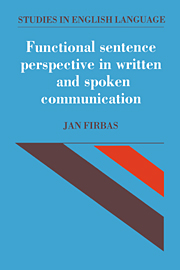Book contents
- Frontmatter
- Contents
- Preface
- List of abbreviations
- Part I Functional sentence perspective in written communication
- 1 Introduction
- 2 The sentence and the carriers of communicative dynamism
- 3 The contextual factor
- 4 The semantic factor
- 5 The theme and the non-theme
- 6 Some special issues of the theory of functional sentence perspective
- 7 Word order and functional sentence perspective
- Part II Functional sentence perspective in spoken communication
- References
- Index
4 - The semantic factor
Published online by Cambridge University Press: 19 November 2009
- Frontmatter
- Contents
- Preface
- List of abbreviations
- Part I Functional sentence perspective in written communication
- 1 Introduction
- 2 The sentence and the carriers of communicative dynamism
- 3 The contextual factor
- 4 The semantic factor
- 5 The theme and the non-theme
- 6 Some special issues of the theory of functional sentence perspective
- 7 Word order and functional sentence perspective
- Part II Functional sentence perspective in spoken communication
- References
- Index
Summary
The verb and its successful competitors
The preceding chapter has shown that in determining degrees of CD, linear modification cannot assert itself if the contextual factor operates counter to it. Another factor capable of operating counter to linear modification is the semantic factor. Its operation will be discussed in the present chapter and in the chapter to follow. In the spoken language, the interplay of factors is joined by intonation. But intonation does not operate in the written language. It will be dealt with in the second part of the present study – in the part devoted to FSP in spoken communication.
The designation ‘semantic factor’ has been chosen for the sake of brevity. What it actually covers is the impact that the semantic character of a linguistic element, as well as the character of its semantic relations, has on the distribution of degrees of CD. The present chapter will concentrate on the role played by the semantic content of the verb and its semantic relations.
We already know that it is only in the absence of certain elements that the verb completes the development (see p. 7) of the communication within a distributional field. In other words, there are elements that, if present, take the development of the communication further than the verb and so come closer to, or even effect, the completion of the communication. In consequence, they prove to be dynamically stronger; they carry a higher degree of CD than the verb. In regard to the dynamics of the communication, they can be looked upon as successful competitors of the verb.
- Type
- Chapter
- Information
- Publisher: Cambridge University PressPrint publication year: 1992



